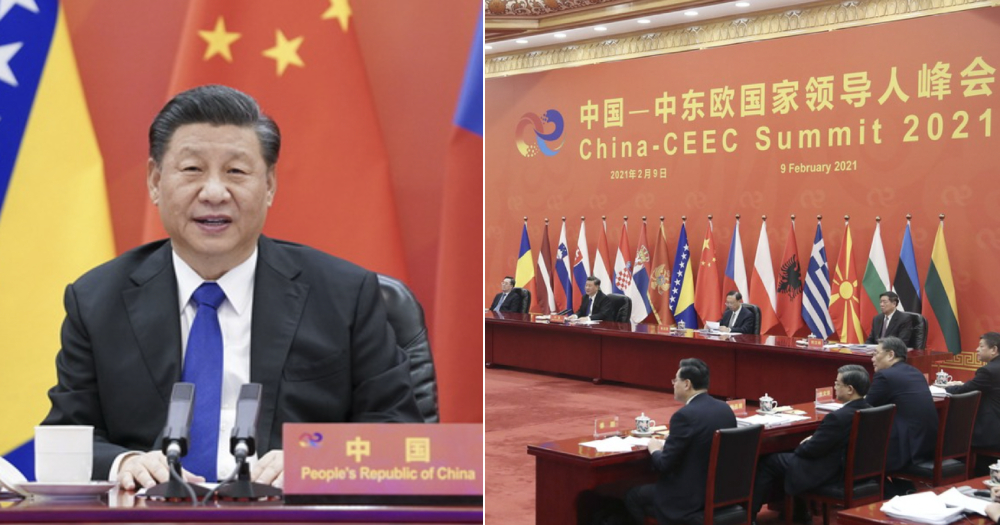Follow us on Telegram for the latest updates: https://t.me/mothershipsg
On Aug. 11, Estonia and Latvia left the "Cooperation between China and Central and Eastern European Countries" grouping, also known as the "16+1".
All three baltic states have pulled out
The grouping, also known as the China CEEC Cooperation, is a dialogue group between China and 17 central and eastern European states, hence its original "17+1" naming.
But in May 2021, Lithuania left, reducing the group to the "16+1". Now fellow Baltic states Estonia and Latvia have followed their neighbour out of the group, further reducing the number.
The China CEEC Cooperation has been variously described by Politco EU and Bloomberg as "China's exclusive club for engaging with Central and Eastern European countries" and for "cooperating on infrastructure and development projects".
China's refusal to condemn Russia causing a rift
But while China might have wanted the format to focus on those infrastructure and development goals, the Baltic states' exit stands as a stark reminder that nations' economic considerations only form one aspect of a complex and multivariate set of interests.
As quoted by Bloomberg, Estonian Foreign Minister Urmas Reinsalu said that China's refusal to condemn the Russian invasion of Ukraine was a factor in deciding to leave the China CEEC Cooperation.
Although China has reiterated the importance of the respect of state sovereignty and territorial integrity, it has stopped short of condemning Russia for its actions, instead calling for restraint on both sides and for them to negotiate peacefully. China has also refrained from using the word "invasion" to describe Russia's war on Ukraine.
China's continued refusal to condemn Russia's invasion is not well received in Central and Eastern Europe, which previously suffered under Russian imperialism.
The Ukraine crisis has not only affected these Baltic states, but has also led to an EU rethink about ties to Russia, which the bloc depends on for energy, and also China. There is new impetus for the EU to reconsider its belief that trade would make authoritarian regimes more amenable.
In March 2021, the European parliament suspended all consideration of a major trade deal with China after China hit back with counter-sanctions on high-profile members of the EU parliament, following the EU's sanctions on four Chinese officials involved in the Chinese government's Xinjiang policy.
Group hasn't been quite beneficial
But Reinsalu also cast doubt on the practicality of the format as a whole, saying,
“This step is therefore principally of political significance. The format hasn’t yielded any significant practical output, and we would prefer to engage in relations with China through the EU as a single entity.”
Lithuanian Foreign Minister Gabrielius Landsbergis said in a tweet that China's "17+1" format was already "redundant and divisive" long before the country quit.
"Latvia and Estonia are now closing the door too. 14+1 should be replaced with EU27+1."
China's 17+1 format was already redundant and divisive long before Lithuania quit. Latvia and Estonia are now closing the door too. 14+1 should be replaced with EU27+1.
— Gabrielius Landsbergis🇱🇹 (@GLandsbergis) August 11, 2022
The China CEEC format at its peak had 12 out of a possible 27 EU members in it. This led some to critique it as an attempt to split the EU against itself, and exploit members who felt overlooked by Brussels, therefore negating the bloc's ability work in concert.
Imbalance of payments
The little benefit the Baltic states have received from being in the group has prompted them to leave as well. According to Bloomberg, Estonia and Latvia exports 195 million and 162 million euros (SGD$272 million and SGD$226 million) respectively to China, as opposed to the billions of investment China said the format would enable.
The three Baltic states apparently are not the only former Warsaw Pact countries that left partly due to this reason.
According to Al Jazeera, the Czech Republic is also considering an exit as of June 2022.
Czech Foreign Minister Jan Lipavsky said that the main goals of the China CEEC Cooperation was economic diplomacy, investment, and mutually beneficial trade, but these have not been fulfilled.
Worse yet are ever expanding balance of payments deficits going in China's favour, adding to the belief that the "16+1" format was not only ineffective, but economically detrimental.
Lipavsky said that those "unfulfilled expectations are leading us to reconsider our participation".
Childish acts
In 2021, Lithuania's exit prompted an outpouring of scorn from China's state-backed media outlets like the Global Times (GT). A GT commentary described Lithuania's move as "overreach", and that this was made worse by allowing Taiwan to set up a liaison office in the country. The commentary said that the country's actions were an attempt to "flatter" the United States and form a values based alliance against China.
It even said called Lithuania "childish" as it's supposedly a small country trying to involve itself in "great power competition". It also said Lithuania's exit would not affect the China CEEC Cooperation's workings.
This was the same tack they would take a year later with the exit of Estonia and Lithuania, with GT again saying that their exits would have limited impacts, and that they never participated much anyway.
The commentary lauded the China CEEC Cooperation as a complimentary mechanism to EU-China engagement, noting the six-fold increase in Chinese investment in central and eastern European states, saying that what these countries really needed was infrastructure development.
This, it said, put them at odds with the goals of the larger EU nations, who prioritised green technology and digital economy; perhaps a bit of an odd comment as the Baltic States are at the forefront of EU initiatives on climate change and digitalisation, and both are long term targets for China as well.
Read more
Top image via Xinhua
If you like what you read, follow us on Facebook, Instagram, Twitter and Telegram to get the latest updates.
